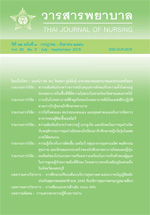การเป็นโรงพยาบาลที่ดึงดูดใจของโรงพยาบาลที่เป็นแหล่งฝึกปฏิบัติ ตามการรับรู้ของนักศึกษาพยาบาล
Main Article Content
Abstract
ผลการศึกษาพบว่านักศึกษาพยาบาลส่วนใหญ่เป็นหญิงร้อยละ 91.2 มีอายุ 20-30 ปี มีเกรดเฉลี่ยสะสม 2.00-3.68 มีการรับรู้การเสริมพลังอำนาจจากทีมการพยาบาล ภาวะผู้นำการเปลี่ยนแปลงของหัวหน้าหอผู้ป่วยและการรับรู้การเป็นโรงพยาบาลที่ดึงดูดใจอยู่ในระดับสูง การรับรู้การเป็นโรงพยาบาลที่ดึงดูดใจมีความสัมพันธ์ทางบวกระดับปานกลางกับการเสริมสร้างพลังอำนาจจากทีม การพยาบาล (r = 0.613) และกับภาวะผู้นำการเปลี่ยนแปลงของหัวหน้าหอผู้ป่วย (r = 0.743) อย่างมีนัยสำคัญทางสถิติที่ระดับ .001
Being magnet hospital in training areas: Nursing students’ perception.
Sengmuang P., Tongvichean, S., Pongprapaphan P., & Jodpimai, S.
The purposes of this study were to examine nursing students’ perception on being Magnet Hospital of training areas and to find the relationships between the empowerment, transformational leadership, and perception on being Magnet Hospital among nursing students of Faculty of nursing, Bangkokthonburi University. The sample of seventy-six nursing students in academic year 2010, was purposively selected. A set of questionnaires was collected including personal information, empowerment from nursing team, transformational leadership of head nurse, and perception on being Magnet Hospital. The Cronbach’s Alpha coefficients of the questionnaires were 0.93, 0.96, and 0.98 respectively. Percentage, mean, standard deviation, and Pearson’s Product-Moment Correlation Coefficient were used in data analysis.
Results revealed that the majority of nursing students were female. Two third of them came from the Northeastern part of Thailand and their age were between 20 to 30 years. Nursing students perceived the empowerment from nursing team and transformational leadership of head nurses at the high level. Overall perception on being Magnet Hospital was at the high level also. There were significantly positive relationship between nursing students’ perception on being Magnet Hospital and empowerment from nursing team (r = 0.613) and transformational leadership of head nurses (r =0.743) at p < .001.


